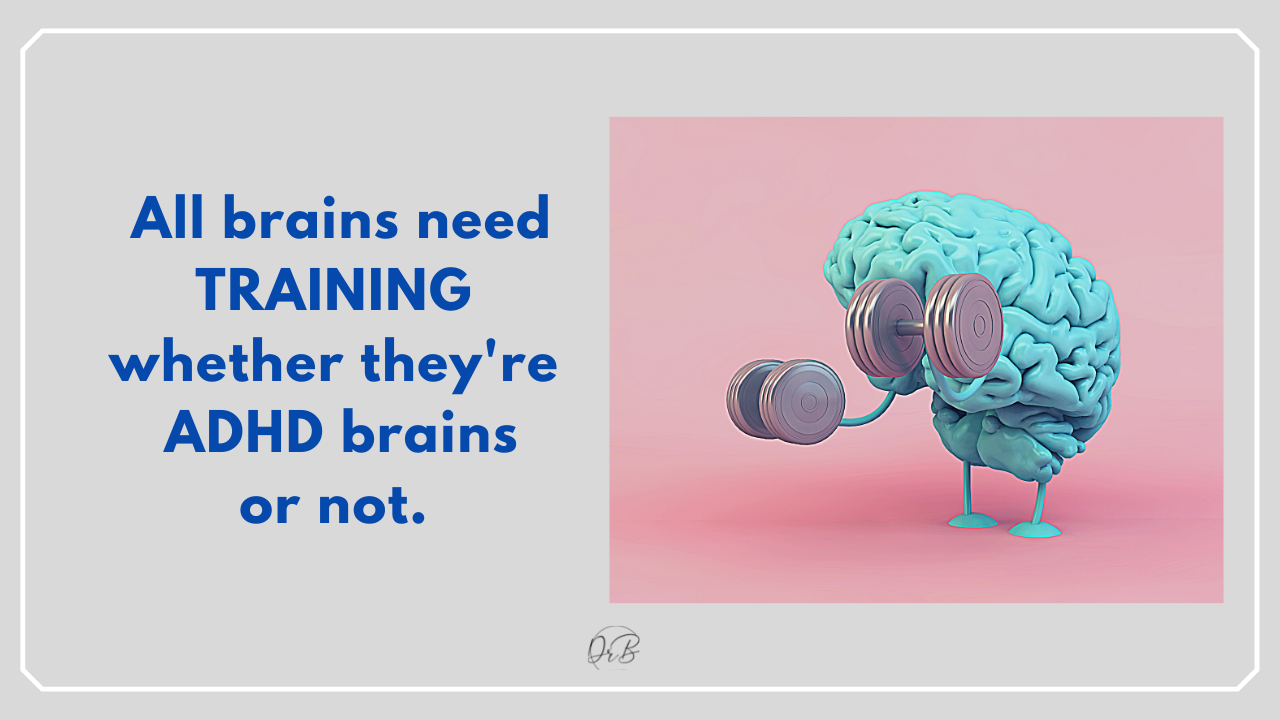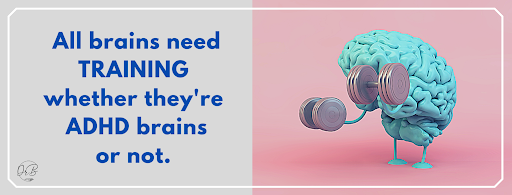
All Brains Need Training
Sep 24, 2021Recently someone asked me if I considered ADHD a disorder, and to what extent is ADHD a disorder based on how our society is structured.

Meaning, if culture were different, would it be better suited to ADHD?
Well, this is an interesting question to consider.
According to the Diagnostic and Statistical Manual of Mental Disorders-V (say that 10 times fast!), ADHD is considered a disorder: Attention Deficit Hyperactivity Disorder. Scientifically speaking, the word “disorder” within the diagnosis indicates that the brain’s activity is not “in order” or is “without order.”
Hmmm, what does that really mean for us and can our brains become “ordered”?
They can, and I’d be thrilled to show you how. But first...
My personal opinion is that there’s NOTHING wrong with your brain if you have ADHD.
It’s fair to have a debate about how our society is structured and how that affects those of us with ADHD. It’s easy to get entangled in the issue of whether ADHD is a disorder or not, when the real issue is what to do about it.
So, let’s not get distracted by all of that. It wastes precious time, and it devalues who we actually are and what we are capable of. Frankly, I thumb my nose at a society that thinks we should all sit quietly as children and “mind our manners.” We all know what people mean when they say that.
We need to celebrate the beauty and magnificence of the amazing organ we call the brain. It’s a fascinating creation and profoundly more complex than we can understand.
Here’s another truth: ALL brains need training, whether they’re ADHD brains or not!
If you experience challenges with being on time, with decision making, with procrastination, with emotional regulation, with task management and follow-through, please understand that all these (and more) are symptoms of under-developed Executive Function skills. These are things that we all can improve with the right motivation and tools.
NEWSFLASH: Neuroplasticity is real. And the prefrontal cortex, the part of the brain where Executive Function processing takes place, is a highly trainable part of our brain.
For example:
- You can teach your brain to focus differently by learning meditation.
- You can train your brain to recognize patterns.
- You can train your brain to pause and respond rather than react.
So what contributes to under-developed Executive Function skills?
EF skills get derailed by living and coping with undiagnosed or improperly treated ADHD, depression, anxiety, trauma, addictions, and chronic illnesses. When our brains are dealing with these experiences, we are not available to develop or master our Executive Function skills. Once these situations pass, our EF skills are developed only to the level of functioning learned before the onset of crisis. Most individuals in these circumstances rely on coping mechanisms which in the long run don’t help them develop the skills they need. We need to rebuild the neural pathways within our brains to develop our derailed skills.
Some say our brains are like super-computers. But we can’t reboot our brains and expect our under-developed skills to magically restart. Our brains don’t work that way. This is why intentional brain training needs to happen, in a very specific way, to fully develop these essential life skills.
In my opinion, it’s rare to find someone with really well-developed EF skills. It’s more common to find someone with a weakness in multiple skills, but who has developed coping mechanisms for getting through life.
Here are some examples:
You may have good Working Memory or Self-Monitoring skills, but your ability to Initiate, Plan or Shift might be under-developed. So you might have gotten through college by cramming and pulling all-nighters, instead of methodically following a schedule to write your papers and engage in study time.
Or, you might be pretty good at Task Monitoring, but struggle with Emotional Control. You look like the model employee, because your perfectionism turns out really high quality work, but when your buttons get pushed you become a slave to your emotions and either lash out at people or shut down completely.
Whether you have ADHD or not, the great news is that we don’t have to stay stuck with these challenges. Our brains are wonderful and unique--brillant, in fact! Learning to harness your brain’s brilliance by training it to function more effectively is a worthy goal that I recommend you pursue with dogged tenacity.
There’s no stopping you, and what you can achieve, once you develop the Executive Function skills you need!

